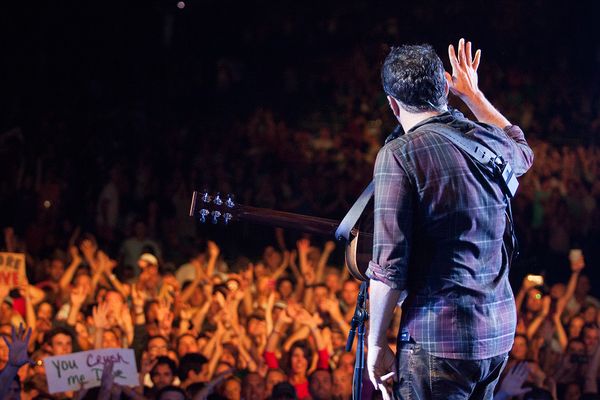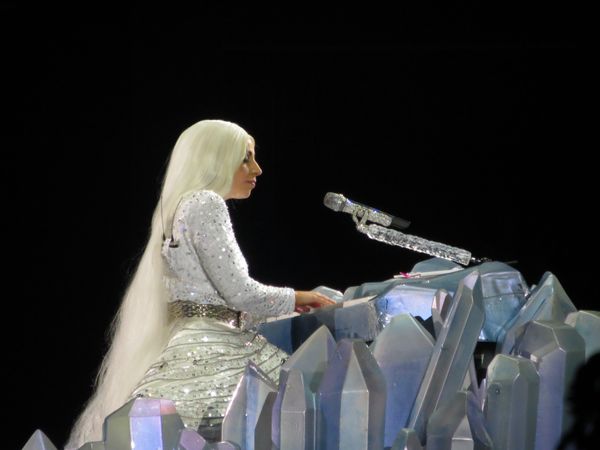Beyoncé's LEMONADE is a tour de force. Artistically, visually, musically, lyrically and thematically. If you haven't seen it (notice my use of seen and not heard), I suppose that's OK, given that HBO is expensive. Luckily for you, it is now available in its entirety on iTunes and Amazon, and I am here to introduce you, armed with a whole lot of appreciation for the true Queen B.
Beyoncé makes it clear that this album is going to get real, and it'll do it real quick. She starts with a clear discussion of an affair, the subject of which

She falls, tumbling off a building, her arms outstretched almost like Christ (a comparison which trails along the visual album) and crashes into water. She stays in this water for the beginning of the next piece, Denial. She describes the feeling of making oneself smaller to ignore the weight of something which you cannot face, a truth which cannot come out. In the whole scene, she remains underwater, manifesting the physical inability to breathe.

She breaks free from this watery prison with the words
But still inside me coiled deep was the need to know
Are you cheeting on me?

Beautiful man, I'm the lion. Beautiful man I know you're lyin. I am not broken I'm not cryin.
Bey makes clear that she is to be feared, that she is the Queen, and that if you try her patience... Well, I will let her sum it up.
This is your final warning. You know I give you life. If you try this shit again, you gon' lose your wife.
In part four, Apathy , Bey's girls join her as she sings about how she isn't "Sorry" (the title of the song) for ignoring (presumably) Jay-Z, basically that she could care less about him and all of his sh*t. Through another extremely powerful poetic section, she asks
So what are you gonna say at my funeral now that you've killed me? Here lies the body of the love of my life, whose heart I broke without a gun to my head. Here lies the mother of my children both living and dead, Rest in peace my true love, who I took for granted, most bomb p*ssy, who because of me, sleep evaded. Her shroud is loneliness, her God is listening. Her heaven would be a love without betrayal.
Ashes to ashes, dust to side chicks
She sings "I ain't thinkin bout you" and "middle fingers up," and some more light-hearted, flippant statements.
In some parts she gets more serious, with "Today I regret the night I put that ring on/He always got them f*ckin excuses" and "Suicide before you see this tear fall down my eyes." She also tells Jay that "he better call Becky with the good hair" rumored to be Rachel Roy, a fashion designer linked with Mr. Carter.
Dear moon: we blame you for floods, for the flush of blood. For men who are also wolves. We blame you for the night, for the dark, for the ghosts

This scene — covered in flames, red light, and pure agony on the part of our Queen — she shifts right into "Six Inch," a very empowering song about a stripper. It takes a dark turn when Bey croaks at the end "Come back/Come back."
Part six, Accountability, begins with a country song (what?) about a father's wisdom to his daughter. Basically, he is telling her to shoot any man who does her wrong. It's a very bad-ass, daddy's-girl, second-amendment, texas-grown song — which, while excellent, is not exactly what we expect from Queen B. Of course, it turns out beautifully, as her work always does.

Why do you deny yourself heaven? Why do you consider yourself undeserving? Why are you afraid of love? You think it's not possible for someone like you. But you are the love of my life. Love of my life, the love of my life, the love of my life.
From this space of seemingly mutual understanding, the arc of this affair, and the havoc it has wreaked on the marriage, comes to its close with part eight, Forgiveness.

Bey sings at the piano, stripped down musically, as shots of she and Jay-Z move in and out of the song, "Sandcastles." She makes clear that she did, at one point, leave the rapper, and that she promised she couldn't return. But, as she says, "every promise/Don't work out that way."
Then comes Resurrection, a section of the album where the lyrics do not fall on deaf ears. The mothers of Trayvon Martin, Michael Brown, and Eric Garner sit, holding photos of their late sons. Lezley McSpadden, Michael Brown's mom, even sheds a tear in front of the camera. Bey and James Blake sing "Forward," a song about moving (forward), about listening, and about fighting. Mostly, it's about love
Part 10, Hope , is full of black women (many famous) and "Freedom" (which is definitely one of Bey's catchiest songs).
I break chains all by myself/Won't let my freedom rot in hell/ Hey! I'ma keep running/Cause a winner don't quit on themselves
Women dance. They cheer. They farm, they cook, they sit in trees. They seem to be untouched, a group of them existing together, without anyone else around for miles. The message is clear: sisterhood, love, freedom, and strength.
Forgiveness , the final part of LEMONADE, describes the coming together of Beyoncé and Jay-Z.
You've brought the orchestra, synchronized swimmers, you are the magician. Pull me back together again the way you cut me in half. Make the woman in doubt disappear. Pull the sorrow from between my legs like silk. Knot after knot after knot.
The audience applauds, but we can't hear them
The screen flashes with many adorable photos of all sorts of people in love, gay and straight, young and old, of all colors and genders. There are also a few extremely cute shots of the Carters, from Jay-Z and Blue playing football, to the three of them celebrating Blue's birthday.
LEMONADE is a love letter to black people, to black women, to womanhood, to the south, to family, to New Orleans, to Jay-Z and Blue Ivy, to roots, to music, to art, and to the Queen and all of her majesty. It is littered with images of Spanish Ivy growing clinging to oak trees, of old houses and old dresses, of afros and all sorts of natural hair, of the ocean and storms on the horizon. There are too many amazing images to sort through all of them. The whole hour is visually stunning.
The insertion of speaking sections—from Beyoncé reading Warsan Shire's poetry, to recordings of Blue Ivy, to a Malcom X speech, to Jay-Z's grandmother, to Bey's own home videos— helps clarify the emotional thread of the album for the watcher. This helps LEMONADE to become a deeply personal experience. Beyoncé bares her soul, and parts are really difficult and raw. Bey is no longer the pretty pop star that from Crazy In Love, or even the sexually liberated, fierce queen from her self-titled album. She is an artist, a full woman, who uses her pain and discontent to weave herself a work which never apologizes for being honest.
Mother dearest, let me inherit the Earth. Teach me how to make him beg. Let me make up for the years he made you wait. Did he bend your reflection? Did he make you forget your own name? Did he convince you he was a God? Did you get on your knees daily? Do his eyes close like doors? Are you a slave to the back of his hand? Am I talking about your husband, or your father?
She doesn't pull punches, discussing exactly what it is like to be a woman wronged, to have your trust broken, and to learn to love again. To take the lemons life has given her, and make something sweet out of them.
Now if you'll excuse me, I have to go cry and watch the whole thing again.
Bey, we are not worthy.






























